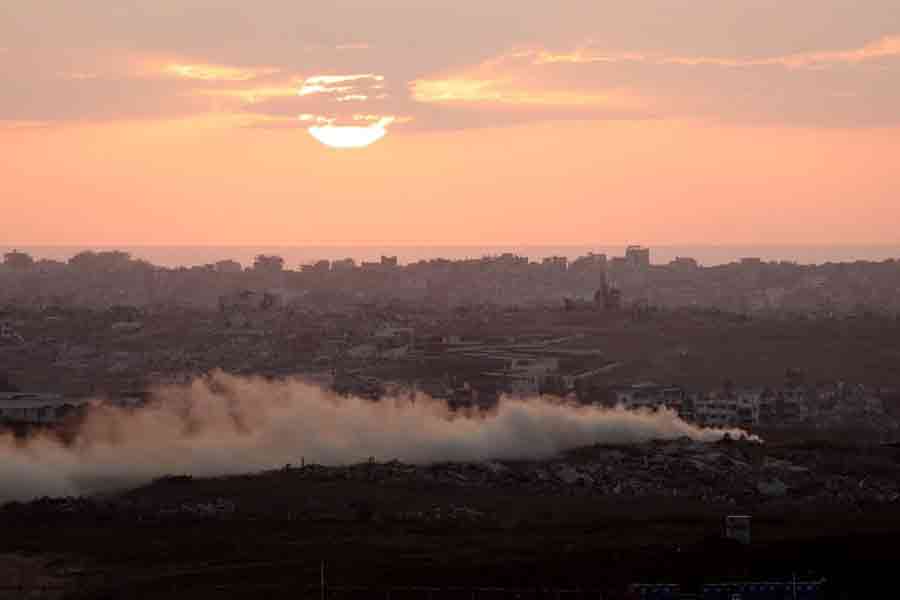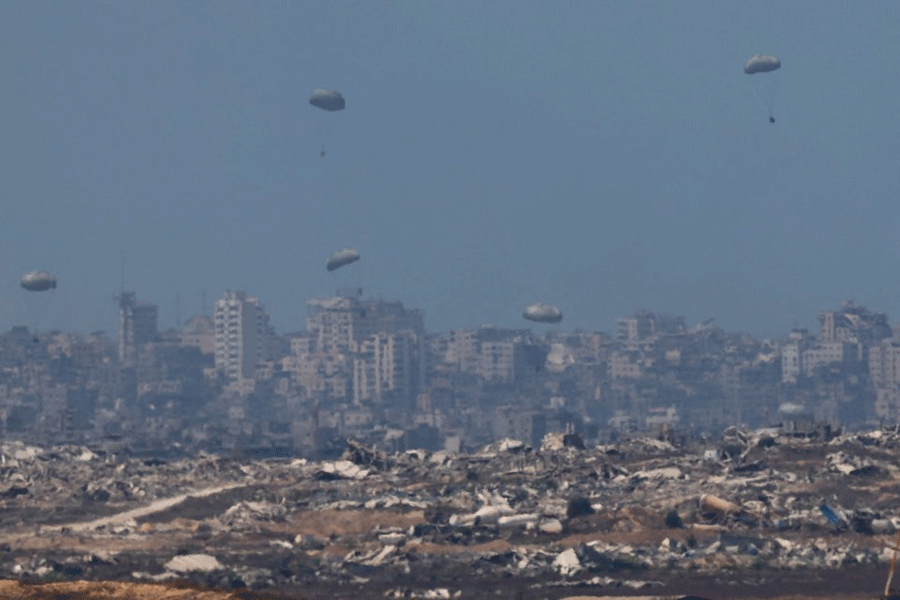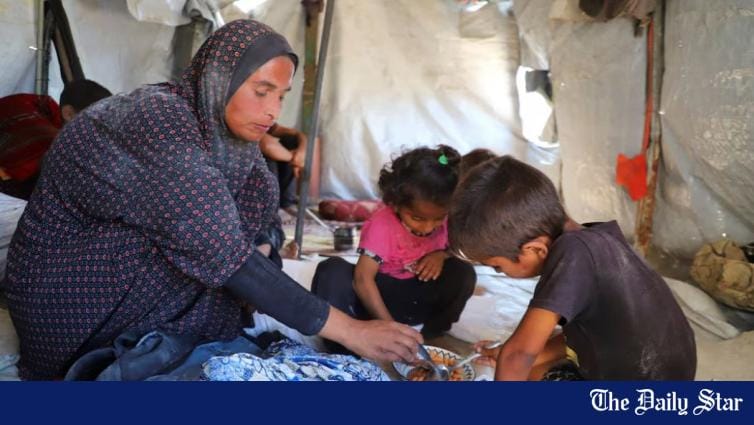Saif
Senior Member
- Joined
- Jan 24, 2024
- Messages
- 16,529
- Likes
- 8,140
- Nation

- Residence

- Axis Group


Israel to decide next steps in Gaza after ceasefire talks collapse
Benjamin Netanyahu will convene his security cabinet this week to decide on Israel's next steps in Gaza following the collapse of indirect ceasefire talks with Hamas, with one senior Israeli source suggesting more force could be an option. Last Saturday, during a visit to the country, US Middle Ea
Israel to decide next steps in Gaza after ceasefire talks collapse
REUTERS
Published :
Aug 04, 2025 23:04
Updated :
Aug 04, 2025 23:04

Smoke rises from Gaza as the sun sets, as seen from the Israeli side of the Israel-Gaza border. Photo : REUTERS/Ronen Zvulun/Files
Benjamin Netanyahu will convene his security cabinet this week to decide on Israel's next steps in Gaza following the collapse of indirect ceasefire talks with Hamas, with one senior Israeli source suggesting more force could be an option.
Last Saturday, during a visit to the country, US Middle East envoy Steve Witkoff had said he was working with the Israeli government on a plan that would effectively end the war in Gaza.
But Israeli officials have also floated ideas including expanding the military offensive in Gaza and annexing parts of the shattered enclave.
The failed ceasefire talks in Doha had aimed to clinch agreements on a US-backed proposal for a 60-day truce, during which aid would be flown into Gaza and half of the hostages Hamas is holding would be freed in exchange for Palestinian prisoners jailed in Israel.
After Netanyahu met Witkoff last Thursday, a senior Israeli official said that "an understanding was emerging between Washington and Israel," of a need to shift from a truce to a comprehensive deal that would "release all the hostages, disarm Hamas, and demilitarize the Gaza Strip," - Israel's key conditions for ending the war.
A source familiar with the matter told Reuters on Sunday that the envoy's visit was seen in Israel as "very significant."
But later on Sunday, the Israeli official signalled that pursuit of a deal would be pointless, threatening more force:
"An understanding is emerging that Hamas is not interested in a deal and therefore the prime minister is pushing to release the hostages while pressing for military defeat."
"STRATEGIC CLARITY"
What a "military defeat" might mean, however, is up for debate within the Israeli leadership. Some Israeli officials have suggested that Israel might declare it was annexing parts of Gaza as a means to pressure the militant group.
Others, like Finance Minister Bezalel Smotrich and National Security Minister Itamar Ben-Gvir want to see Israel impose military rule in Gaza before annexing it and re-establishing the Jewish settlements Israel evicted 20 years ago.
The Israeli military, which has pushed back at such ideas throughout the war, was expected on Tuesday to present alternatives that include extending into areas of Gaza where it has not yet operated, according to two defence officials.
While some in the political leadership are pushing for expanding the offensive, the military is concerned that doing so will endanger the 20 hostages who are still alive, the officials said.
Israeli Army Radio reported on Monday that military chief Eyal Zamir has become increasingly frustrated with what he describes as a lack of strategic clarity by the political leadership, concerned about being dragged into a war of attrition with Hamas militants.
A spokesperson for the Israel Defense Forces (IDF) declined to comment on the report but said that the military has plans in store.
"We have different ways to fight the terror organization, and that's what the army does," Lieutenant Colonel Nadav Shoshani said.
On Tuesday, Qatar and Egypt endorsed a declaration by France and Saudi Arabia outlining steps toward a two-state solution to the Israeli-Palestinian conflict, which included a call on Hamas to hand over its arms to the Western-backed Palestinian Authority.
Hamas has repeatedly said it won't lay down arms. But it has told mediators it was willing to quit governance in Gaza for a non-partisan ruling body, according to three Hamas officials.
It insists that the post-war Gaza arrangement must be agreed upon among the Palestinians themselves and not dictated by foreign powers.
Israel's Foreign Minister Gideon Saar suggested on Monday that the gaps were still too wide to bridge.
"We would like to have all our hostages back. We would like to see the end of this war. We always prefer to get there by diplomatic means, if possible. But of course, the big question is, what will be the conditions for the end of the war?" he told journalists in Jerusalem.
REUTERS
Published :
Aug 04, 2025 23:04
Updated :
Aug 04, 2025 23:04
Smoke rises from Gaza as the sun sets, as seen from the Israeli side of the Israel-Gaza border. Photo : REUTERS/Ronen Zvulun/Files
Benjamin Netanyahu will convene his security cabinet this week to decide on Israel's next steps in Gaza following the collapse of indirect ceasefire talks with Hamas, with one senior Israeli source suggesting more force could be an option.
Last Saturday, during a visit to the country, US Middle East envoy Steve Witkoff had said he was working with the Israeli government on a plan that would effectively end the war in Gaza.
But Israeli officials have also floated ideas including expanding the military offensive in Gaza and annexing parts of the shattered enclave.
The failed ceasefire talks in Doha had aimed to clinch agreements on a US-backed proposal for a 60-day truce, during which aid would be flown into Gaza and half of the hostages Hamas is holding would be freed in exchange for Palestinian prisoners jailed in Israel.
After Netanyahu met Witkoff last Thursday, a senior Israeli official said that "an understanding was emerging between Washington and Israel," of a need to shift from a truce to a comprehensive deal that would "release all the hostages, disarm Hamas, and demilitarize the Gaza Strip," - Israel's key conditions for ending the war.
A source familiar with the matter told Reuters on Sunday that the envoy's visit was seen in Israel as "very significant."
But later on Sunday, the Israeli official signalled that pursuit of a deal would be pointless, threatening more force:
"An understanding is emerging that Hamas is not interested in a deal and therefore the prime minister is pushing to release the hostages while pressing for military defeat."
"STRATEGIC CLARITY"
What a "military defeat" might mean, however, is up for debate within the Israeli leadership. Some Israeli officials have suggested that Israel might declare it was annexing parts of Gaza as a means to pressure the militant group.
Others, like Finance Minister Bezalel Smotrich and National Security Minister Itamar Ben-Gvir want to see Israel impose military rule in Gaza before annexing it and re-establishing the Jewish settlements Israel evicted 20 years ago.
The Israeli military, which has pushed back at such ideas throughout the war, was expected on Tuesday to present alternatives that include extending into areas of Gaza where it has not yet operated, according to two defence officials.
While some in the political leadership are pushing for expanding the offensive, the military is concerned that doing so will endanger the 20 hostages who are still alive, the officials said.
Israeli Army Radio reported on Monday that military chief Eyal Zamir has become increasingly frustrated with what he describes as a lack of strategic clarity by the political leadership, concerned about being dragged into a war of attrition with Hamas militants.
A spokesperson for the Israel Defense Forces (IDF) declined to comment on the report but said that the military has plans in store.
"We have different ways to fight the terror organization, and that's what the army does," Lieutenant Colonel Nadav Shoshani said.
On Tuesday, Qatar and Egypt endorsed a declaration by France and Saudi Arabia outlining steps toward a two-state solution to the Israeli-Palestinian conflict, which included a call on Hamas to hand over its arms to the Western-backed Palestinian Authority.
Hamas has repeatedly said it won't lay down arms. But it has told mediators it was willing to quit governance in Gaza for a non-partisan ruling body, according to three Hamas officials.
It insists that the post-war Gaza arrangement must be agreed upon among the Palestinians themselves and not dictated by foreign powers.
Israel's Foreign Minister Gideon Saar suggested on Monday that the gaps were still too wide to bridge.
"We would like to have all our hostages back. We would like to see the end of this war. We always prefer to get there by diplomatic means, if possible. But of course, the big question is, what will be the conditions for the end of the war?" he told journalists in Jerusalem.






































